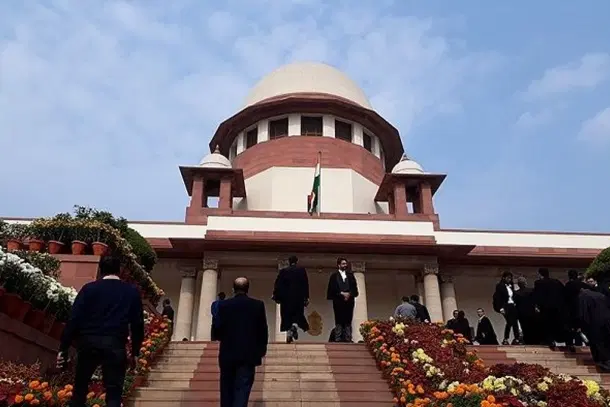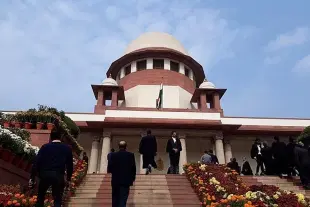Analysis
Another SC Power-Grab: Why Government Must Say A Firm 'No' To Bench On Poll Panel
R Jagannathan
Nov 24, 2022, 11:15 AM | Updated 11:15 AM IST
Save & read from anywhere!
Bookmark stories for easy access on any device or the Swarajya app.


If the five-judge Supreme Court bench hearing petitions on the Election Commission of India finally ends up injecting itself into the selection process for commissioners, it will clearly be a case of judicial over-reach and power-grab.
On Tuesday (22 November), the bench, headed by K M Joseph, wondered if consultations with the Chief Justice of India (CJI) would not make the process better.
It also asked for the files relating to the appointment of Arun Goel as Election Commissioner a few days ago. It also made unwarranted remarks on the impartiality of the commission.
A Hindustan Times report quotes the bench as saying the following in the context of the fact the most chief election commissioners have short tenures, thus implying that they may be pliable.
Justice K M Joseph is quoted as saying: “It’s a very, very disturbing trend. After TN Seshan (who was CEC for six years between 1990 and 1996), the slide began when no person has been given a full term.”
The bench went on: “"In this way, the so-called independence, which is just lip-service, is completely destroyed... Particularly in view of the disturbing trend we have found... nobody can question them since there is no check….Pick up someone and give him a highly truncated tenure. He is obligated; does your bidding... we are not saying so but it looks like that.” (Italics mine).
This is hypocrisy camouflaged as concern for the Election Commission’s independence and integrity.
Ask yourself, which of these allegations — on tenure or selection process — do not apply to the Supreme Court itself, and the self-serving process it has adopted to appoint judges to the higher courts?
The last chief justice got just 74 days in office, and the current one will get about two years. Most previous chief justices got less than two years. Which CJI got a “full term”?
To wilfully and in open court suggest that the Election Commission, which has conducted hundreds of elections fairly competently, is somehow compromised, it shows how one constitutional arm can delegitimise another just because its own powers are greater.
Phrases like “lip service” were used to undermine assumptions about the EC’s independence, which has apparently been “completely destroyed”.
The bench also said that “something has to be corrected somewhere... Situation on the ground is fairly alarming.”
Really?
How did the bench come to the conclusion that the situation is alarming, and disturbing, and thus ripe for intervention by the Supreme Court?
Beyond the fact that chief election commissioners have had short tenures, does the bench have any evidence to conclude that the commission as a whole lacks independence?
And after saying all that it did, how can the bench, with a straight face, say that “we are not saying so, but it looks like that.”
If the government has any guts, it should say a strong “No” to the bench’s fishing expedition by demanding the files for Goel’s appointment.
If the court is going to look at every administrative decision and demand files, it will not only destroy trust within government, but compromise administrative efficiency, since every bureaucrat will now write only safe comments while passing on files to the next level.
And the government should, in turn, demand that the Supreme Court collegium should disclose its own selection processes, file notings and discussions.
There is no more unaccountable institution than the Supreme Court, and this is further evidence of that.
The government should, after refusing to produce Goel’s files, convene a meeting with the top three or four political parties and evolve a consensus on how election commissioners should be chosen.
It should not let the Supreme Court muscle its way in. Without a political consensus, the Supreme Court will keep injecting itself into more and more areas of executive and legislative concern.
Jagannathan is former Editorial Director, Swarajya. He tweets at @TheJaggi.





